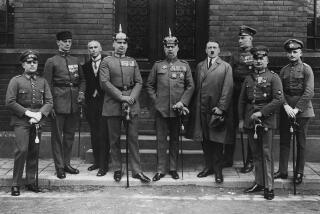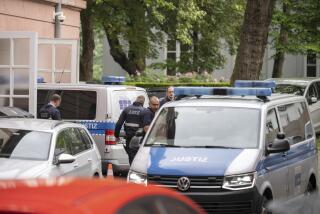COLUMN ONE : Pitfalls in the Pursuit of Justice : The case against 4 former East German border guards is trying the nation’s legal system. Should a democracy judge events that occurred under Communist rule?
BERLIN — Since early last September, four young men--former East German border guards--have faced their accusers across the gloom of Courtroom No. 700 in the capital’s main criminal justice building.
Lost and visibly defeated amid the array of lawyers, judges, journalists and curiosity-seekers that crowd the court each day, the four are charged with manslaughter: shooting 20-year-old East German Chris Gueffroy as he tried to flee across the Berlin Wall on a cold February night in 1989.
In a very real way, however, it is Germany’s legal system that is on trial in what has become the country’s most controversial and most important legal proceedings since unification 15 months ago.
As prosecutors and defense attorneys last week began their summing-up arguments, those involved realized that far more turns on the eventual judgment than the fates of four young lives.
The trial’s outcome will help answer the fundamental question of whether a democratic legal system can dispense justice in connection with events that occurred in a dictatorship outside its own jurisdiction.
This answer will shed light on the larger issue of whether the courts--or some other forum--offer the best way for Germans to deal with the excesses of the era of Communist rule in the eastern region.
“The need in both parts of the country to come to grips with this history is very urgent,” acknowledged the Christian Democrats’ parliamentary leader, Wolfgang Schaeuble.
The trial’s result also is certain to set a precedent that will influence the 350 other criminal cases launched since unification against other former East German frontier guards in connection with violent deaths along the Cold War’s most infamous frontier.
Between August, 1961, when the Berlin Wall sealed off the last East German exit to the West, and November, 1989, when the wall was breached, more than 200 people died trying to flee to the West. Gueffroy was the last known victim.
Legal experts say that a guilty verdict would also instantly become a powerful weapon in the hands of those pushing to prosecute senior members of the former Communist dictatorship. They are the ones who actually shaped the shoot-to-kill policy along the inner German border and presided over a regime that condoned summary arrest and arbitrary punishment and turned husband against wife in one of the most comprehensive, cynical internal security systems ever developed.
So far, efforts by Chancellor Helmut Kohl’s government to try members of the former East German leadership for repression have resulted only in a series of acutely embarrassing failures.
As a state prosecutor pleaded in court here for guilty verdicts against the border guards, former East German leader Erich Honecker, the man who built the Berlin Wall, was busy applying for back pension payments from the safety of the Chilean Embassy in Moscow, where he has sought refuge.
Egon Krenz, Honecker’s successor and for years the Politburo member responsible for internal security, now sells real estate in western Berlin, while Alexander Schalck-Golodkowski, a senior member of the dreaded state security arm, the Stasi, and the man who supplied the regime with hard currency through a series of highly dubious business dealings, lives comfortably in a lakeside villa outside Munich and demands $13,000 for his television talk show appearances.
Others, such as former Stasi chief Erich Mielke, Defense Minister Heinz Kessler and Defense Council chairman Fritz Streletz, are in judicial custody on various charges, but evidence has proved hard to find, and so far no trial dates have been set.
The only two members of the East German hierarchy who have faced trial, trade union boss Harry Tisch and a secondary political figure named Gerald Goetting, were found guilty of minor fraud and immediately set free in judgments that seemed to trivialize the entire effort to bring members of the Communist regime before the courts.
Some, such as Bonn University historian Karl Dietrich Bracher, agree that it is morally wrong to place simple soldiers on trial before pursuing the political leaders who shaped the soldiers’ values and issued their shoot-to-kill orders.
“It’s terrible; I don’t like it, but the problem is, we have to first establish a legal procedure, and for that, it is much easier to punish those who fired the shots,” he said.
“If we’re going to get the big people, we have to build up from the bottom first,” echoed Heiner Sauer, director of the Collection Center for Documentary Evidence, an organization based in the western city of Salzgitter that for years assembled material on East German repression.
Reflecting a widespread public sense of unfairness over the flow of events, the chief prosecutor last week asked for a guilty verdict, but he also asked that the four soldiers be given only suspended jail sentences.
Aware of both the public desire for some kind of retribution and the danger that the border guards may be the only ones who ever face the courts, the German government has announced plans to establish a special parliamentary commission to investigate the misuse of power in Communist East Germany.
“People’s expectations are high, especially in eastern Germany, but these cannot be satisfied by legal means,” said Schaeuble in announcing the commission. “In many instances, injustice may go unpunished.”
Surrounded by these larger issues, the trial in Room 700 is a compelling human drama, whose outcome is far from clear.
For those who have listened to the victim’s mother, Karin Gueffroy, a co-prosecutor in the case, it is difficult to reject the plea that even though her son’s death may not have been premeditated, it was nevertheless murder, and those who shot him should pay for their crime.
The four--Peter Schmett, Andreas Kuehnpast and Mike Schmidt, all 27, and Ingo Heinrich, 26--do not dispute that they were the guards involved in the incident in which Gueffroy died.
But Hubert Dreyling, defense lawyer for Kuehnpast, has argued that to expect a young, well-trained soldier to cast aside his belief in his own political system, to be aware of international human rights conventions unknown even to trained lawyers in the former Communist state and to risk imprisonment by disobeying orders to shoot is little short of absurd.
“It’s a kind of trick to use our values and our viewpoint to judge someone who has lived by a completely different yardstick,” Dreyling said. “ ‘Not guilty’ is the only judgment that would be fair to my client.”
The legal tangle itself, involving international law and the laws of two countries, is as unusual as it is complex and illustrates the difficulty of using judicial means to deal with political and historical misdeeds.
Although tried by Western courtroom rules, the former soldiers are charged under old East German law, a formula set out under the terms of German unification. Those terms state that suspects for crimes committed in East Germany can only be prosecuted under East German law existing at the time.
While the former soldiers are charged with manslaughter under the East German criminal code, that statute conflicts directly with clearly established procedures set out for border guards that allowed shooting as a last resort to prevent anyone fleeing to the West.
The prosecution’s cases appears to hinge to a large extent on the ability to prove East Germany’s adherence to international law, such as the Helsinki Final Act, and United Nations and European conventions on human rights--all of which made the shooting orders illegal.
A judgment is expected later this month.
More to Read
Sign up for Essential California
The most important California stories and recommendations in your inbox every morning.
You may occasionally receive promotional content from the Los Angeles Times.










